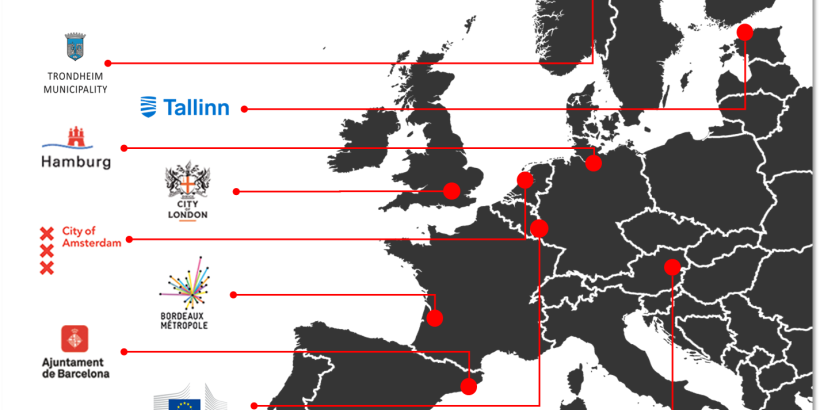Key points:
- The report covers essential issues of digital transformation in the Western Balkans (WB) Local Government through various sections.
- One of the primary issues is the lack of human resources equipped with the right knowledge and skills on digital competencies.
- An observational assessment of the current state and topics of the Governmental Training Institutes in WB in addressing the shortage of digital capabilities in local government.
What is the Report “Empowering Progress with Digital Transition in Western Balkan and Moldova Local Governments”?
This report analyzes digitalization in local government in the Western Balkans (WB) and Moldova, highlighting potential, best practices, areas for improvement, and the need for collaboration among stakeholders (central government, EU, business, and academia). For the purposes of this policy study, the analysis will be limited to WB case.
Target Audience
This Policy paper will help different actors, like WB Local Governments, WB Governmental training institutions, policy makers, trainers, coaches, mentors, by giving an overview of current state of public organizations training organizations in WB and digital skills gabs for local government.
Methodology
This policy paper is the result of the research conducted based on the report, “Empowering Progress with Digital Transition in Western Balkan and Moldova Local Governments”, from NALAS and KDZ-Austria as part of the BACID III program (Rupp et al., 2023, p. 3).
This Policy paper focus exclusively on the "Enhancing digital skills" component in WB, to strengthen the role of digital competencies to equip the local government with the right knowledge to fulfill their tasks.
The paper conducts a semi-structured interview with a senior expert of the Network of Associations of Local Authorities in South-East Europe (NALAS).
How is WB doing?
Digital transformation employs not only new technologies but also changes to organizational structures, work processes, skills, culture, and mindset. Referring to the report, human and financial resources are also among the most frequently mentioned issues (Rupp et al., 2023, p. 65).
Building capacities at the local government level is crucial for successful digital transformation and smart city initiatives (Rupp et al., 2023, p. 42).
Local Government should take advantage of the training opportunities offered by Local Government Associations and existing platforms in the region such as the NALAS e-Academy (an online platform).
Furthermore, the report refers to a potential initiative to upgrade the NALAS e-Academy, (e-Learning platform) as an innovative platform offering tailored training courses for Local Government Officials (Rupp et al., 2023, p. 10).
Although the potential NALAS initiative this policy paper will give an observational assessment of the current state and training programs of the Governmental training institutions in WB in addressing the shortage of digital capabilities in local government.
These institutions are listed as follows:
- Albanian School of Public Administration (ASPA)
- The Public Administration Reform Coordinator’s Office in Bosnia and Hercegovina (PARCO)
- Kosovo Institute for Public Administration (KIPA)
- Human Resource Management Authority in Montenegro (HRMA)
- Ministry of Information Society and Administration in North Macedonia (MISA)
- The National Academy of Public Administration in Serbia (NAPA)
- Regional School of Public Administration (ReSPA).
Below the paper give the current state of these Governmental training institutions.
Albanian School of Public Administration (ASPA)
The Albanian School of Public Administration (ASPA) is a major public institution with administrative and academic autonomy whose aim is to train civil servants from the central and local governments, independent institutions, and individuals outside the civil service. ASPA was first established in 2000 as the Training Institute of Public Administration, and since 2013 it has been known as the Albanian School of Public Administration (Aspa 2024a).
ASPA operates based on articles 8 and 9 of Law no. 152/2013 "On Civil Servants", as well as the Decision of the Council of Ministers no. 138, of 12.04.2014, “For the organization and functioning of the Albanian School of Public Administration, training of civil servants and others individuals outside the civil service", and is assisted by the Department of Public Administration in developing policies for training programs for Albanian Civil Servants.
The research found the following digital skills ASPA (2024b) topics based on the ASPA training calendar and module that include the local government as well:
Office packet (Windows and Microsoft Office), Opportunities and challenges for the Public and Private Sectors in the AI era, Artificial intelligence and human rights, The right to information and protection of personal data, Induction for Municipal Councilors, Application management system, Digital integration in the EU, the Regulatory framework for electronic communications according to the EU acquis, Services and the digital market, Network and information systems security (Aspa 2024c)
Moreover, according to Gjonaj (2023, p.1) from the Albanian Telegraphic Agency, stated that the state minister for Local Government announced that a Local Government Academy is aimed to be designated by the beginning of 2024.
The academy's purpose will be to train local government officials in various programs, including urban planning, legislation, procurement, territory control, etc. (Gjonaj 2023, p.1).
The Public Administration Reform Coordinator’s Office in Bosnia and Hercegovina (BiH)
The Public Administration Reform Coordinator’s Office in BiH is established with the decision of the Chairperson of the Council of Ministers of Bosnia and Herzegovina (Official Gazette of BiH, no. 4/05, 33/07 and 85/10). The agency coordinates public administration reform (PAR) with BiH institutions, entities, and the Brčko District. The agency can offer training courses and workshops for all administrative levels in terms of PAR, including officials of cantonal governments and assemblies, and cantonal representatives (Parco 2024).
Currently the Public Administration Reform Coordinator’s Office, in cooperation with the Agency for the Civil Service of BiH, the Agency for the Civil Service of the Federation of BiH, the Agency for State Administration of Republic Srpska and the Human Resources Subdivision of the Brčko District of BiH are planning to incorporate specialized training on enhancing the administrative and legal framework as well as digital transformation into their continuously training programs starting in 2024 (Public Administration Reform Coordinator's Office 2024, p.67).
Kosovo Institute for Public Administration (KIPA)
Kosovo Institute of Public Administration, (KIPA), was established in 2003, and currently operates based on Law no. 04 / L -221 “On the Kosovo Institute for Public Administration”, and Law no. 03 / L-149, “On the Civil Service of the Republic of Kosovo”. KIPA conducts training for all civil servants and public administration positions at the central and municipal levels in Kosovo, coordinating all training activities with local and international organizations (Kipa 2024a).
The research found the following digital skills topics based on the KIPA training calendar (Kipa 2024b) that include the local government as well:
Statistical Analysis and Interpretation (SPSS), Budget development and management systems (BDMS), MS Project, Microsoft Power Point and Outlook, Microsoft Excel, Microsoft Visio & Microsoft Publisher, ICT project management.
Human Resource Management Authority Montenegro (HRMA)
The Human Resources Management Authority Montenegro, (HRMA) is a public organization established in 2004 under the Ministry of Public Administration. The HRMA is in charge of implementing the Civil Servants and State Employees Law, as well as coordinating professional development policies and human resource management across the entire public administration. Training of civil servants at the central and local level is carried out permanently (Support to Public Administration Reform in Montenegro 2017, p.4-5).
The research found the following topics based on the HRMA training calendar (Gov.ME 2024) for digital skills in public administration:
IT data protection and protection of personal data.
Ministry of Information Society and Administration in North Macedonia
The Ministry of Information Society and Administration in the Republic of North Macedonia (MISA), is responsible for drafting strategic documents for efficient and effective operation, training and professional development of state and public administrative officers, and training organization and implementation (Vlada 2024).
The Ministry is responsible for the performance of competencies related to the professional development and training of officials. Following the current trends in the field of digital training services, the Ministry provides e-learning for employees. For this purpose, two electronic systems are active. (e-obuki 2024).
The research found the following topics based on the MISA training calendar (lms.mioa 2024) for digital skills in public administration:
Cyber Hygiene, Internet Security Handbook, Handbook of Cyber Threats, Strategies and innovations.
The National Academy of Public Administration in Serbia (NAPA)
The National Academy for Public Administration (NAPA) operates based on NAPA Law (Official Gazette of Serbia no. 94/2017). NAPA was founded in 2018 with the primary responsibility of providing training for Serbia's public administration. It is an officially public organization recognized for its non-formal adult training programs. NAPA is responsible to design and implement training programs for both central and local government officials (Napa 2024a).
Furthermore, referring to the Public Administration reform started in 2021, NAPA is involved in improving the capacity building of the Local Government Units through the digitization of training programs (Voinea et al., 2023, p.13).
The research found the following topics based on the NAPA training calendar for digital skills in local government (Napa 2024b):
Text editing, Spreadsheet calculations, Presentations, Databases, Text editing (advance level), Spreadsheet calculations (advance level), Data bases (advance level), Pivot tables, Statistical data processing via SPSS program, Key elements of e-governance infrastructure, Establishing services on the e-governance portal, Visibility of internet presentations and implementation of guidelines for developing internet presentations, Open data portal, Introduction to internet usage, IT security, Project management via Microsoft project software, Introduction to information security, Administration oriented toward citizens and digitalization.
Regional School of Public Administration (ReSPA)
The Regional School of Public Administration (ReSPA) is a regional institution founded in 2010 as a combined project supported by the European Commission and Western Balkan, with the mission to support the creation of transparent, accountable, and professional WB public administration institutions that provides efficient services to the benefit citizens and businesses. Albania, Bosnia and Herzegovina, the Republic of North Macedonia, Montenegro, and Serbia are the five ReSPA Members in charge of overseeing it, with Kosovo serving as a beneficiary. ReSPA offered its resources, experience, and broad skillset to enable the governments of the WB to gain access to international best practices, thorough research reports that provide strong recommendations for enhancing the quality of the public administration system, tailor-made expertise, and capacity-building tools. (Respa 2024a)
Currently, ReSPA is working on launching the Knowledge Management Platform, which will provide access to live and pre-recorded training courses, exchange information about relevant learning opportunities, and act as a regional knowledge hub on public administrations and reforms to assist the development of administration capacities in the region. (Respa 2024b)
Meanwhile, ReSPA continues to provide the region's public administration with various research publications aimed at improving service delivery through digitalization and quality management. (Respa 2024c)
Digital competencies training offered among WB countries
We will take as a benchmark for the method proposed in this section the study of Ferrari et al., (2013, p.13) in which according to his study he proposes a self-assessment approach and group them in three different skill levels, from A to C. This study will divide them in basic competences (Level A) and advance (B to C), because we lack of completely data related to the range of digital skills training programs among WB schools of public administration.
To dive more into this skills level of competencies, the Level A is used to point out a basic competence, in which the user has few notions about the competition, understanding for example in the information management dimension that not all information on the internet is truthful, and being able to use search engines to obtain it. The user who has a level A is aware of their limitations using technology and knows that there are users around them who know many more functionalities of the software, but are not proactive to learn (Ferrari et al., 2013, p.14).
Level B is defined as an intermediate stage of knowledge and skill in which the user demonstrates a higher and more transversal mastery of digital skills. The B-level user is able to have moderate discretion when browsing the internet, is familiar with different multimedia tools, knows how to relate concepts of the world online and offline, and shows proactivity in learning and improving their skills (Ferrari et al., 2013, p.14). Level C, user proficiency in digital skills is considered. The user at this level is able to detect their learning needs about digital skills and is able to obtain the necessary tools to solve problems. It has an informed stance in the use, impact, magnitude, problems and developments of software and is capable of making decisions related to this in a critical way, evaluating which are the safest and most reliable options (Ferrari et al., 2013, p.14)
A deeper investigation is required to identify and group the existing digital competences training offer. This could be done also according to the EU DigComp framework. (EU Commission Recommendation on Key Competences for Life-long Learning 2018, p.10).

According to the table no.1 the majority of the country’s cases are focused on strengthening digital capabilities for local governments. Our observations show that, although Kosovo only offers basic courses on digital skills like the MS package, Albania and Serbia offer advanced training courses in digital skills like ICT and e-government. While lacking a basic digital skills training program, Montenegro and North Macedonia are more focused on providing some more advanced training programs on data protection and cyber security. Beginning in 2024, Bosnia and Herzegovina intend to include specialized training on improving the administrative side of the digital transition in their ongoing training programs.
Findings
Our Policy paper is limited to the WB's "Enhancing digital skills" component, which aims to strengthened the role of digital competencies by providing the local government with the necessary expertise to carry out its duties.
Findings indicate that:
- Every country in WB has a specific Governmental training institution for Public Administration.
- Each Governmental training institution can provide capacity-building for local government.
- These Governmental training institutions often do not offer specialized digital skills training programs for local government, instead, they offer combined programs for both local and central government.
- Building digital capacities at the local government level is essential for effective digital transformation.
- Local governments in WB can take advantage of training opportunities offered by Local Government Associations and existing platforms in the region, such as the NALAS e-Academy, or ReSPA.
Conclusion
The findings of the report "Empowering Progress with Digital Transition in Western Balkan and Moldova Local Governments" emphasize the significance of improving digital skills in local governments, which aligns with the policy paper. Important findings indicate that more training program on digital competencies and stakeholder collaboration are required on local level in WB.
Prospective upgrades and initiatives such as the NALAS e-Academy and ReSPA training programs, are viable paths toward filling the skills gap in digitalization for the region. All Governmental training institutions in WB, are engaged in training and adjusting to the digital revolution, highlighting the critical role that capacity building at the local level plays.
A more in-depth analysis is required to better evaluate the need for additional digital skills training programs by identifying and categorizing existing digital competencies training offerings across local governments in the Western Balkans.
References:
Aspa. (2024a). Kush jemi ne? Retrieved from https://aspa.gov.al/en/kush-jemi-ne/. Access: 5. March 2024.
Aspa. (2024b). Kalendar i trajnimit. Retrieved from https://aspa.gov.al/en/kalendar?. Access: 5. March 2024.
Aspa. (2024c). Modulet e trajnimit. Retrieved from:https://aspa.gov.al/en/modulet-e-trajnimit/. Access: 5. March 2024.
European Commission, Directorate-General for Education, Youth, Sport and Culture. (2019). Key competences for lifelong learning, Publications Office. Retrieved from https://data.europa.eu/doi/10.2766/569540. Access: 25. March 2024.
Ferrari, A., Punie, Y., & Brečko, B. (2013). DIGCOMP: A framework for developing and understanding digital competence in Europe. Retrieved from https://op.europa.eu/en/publication-detail/-/publication/297a33c8-a1f3-…. Access: 21. March 2024.
Gjonaj, A. (2023, December 2). Mazniku: Në fillim të vitit të ardhshëm ngrihet Akademia e Pushtetit Vendor - ATSH -. Agjencia Telegrafike Shqiptare. https://ata.gov.al/2023/12/02/mazniku-bashkite-nevoje-per-kapacitete-pe…. Access: 1. March 2024.
Gov.ME. (2024). Retrieved from https://www.gov.me/en/search?page=1&sort=relevance&q=training. Access: 7. March 2024.
Kipa. (2024a). Retrieved from https://ikap.rks-gov.net/. Access: 6. March 2024.
Kipa. (2024b). Retrieved from https://ikap.rks-gov.net/calendar. Access: 6. March 2024.
lms.mioa. (2024). MIOA. Retrieved from https://lms.mioa.gov.mk/my/. Access: 7. March 2024.
Napa. (2024a). Retrieved from: https://napa.gov.rs/tekst/en/115/about-us.php. Access: 12. March 2024.
Napa. (2024b). Retrieved from: https://napa.gov.rs/tekst/en/153/general-training-programme-for-employe…. Access: 12. March 2024.
Parco. (2024). Retrieved from: https://parco.gov.ba/en/. Access: 13. March 2024.
Public Administration Reform Coordinator's Office. (2024). Annual Progress Report for 2023.pdf. Retrieved from https://parco.gov.ba/wp-content/uploads/2024/02/Annual-progress-report-…. Access: 6. March 2024.
Respa. (2024a). Retrieved from: https://www.respaweb.eu/9/pages/5/who-we-are. Access: 14. March 2024.
Respa. (2024b). Retrieved from: https://www.respaweb.eu/91/tenders/367/notice-for-services-development-…. Access: 14. March 2024.
Respa. (2024c). Retrieved from: https://www.respaweb.eu/25/research#service-delivery-digitalization-and…. Access: 14. March 2024.
Rupp, C., Belcheva, J., Weixlbroun, V., Stafa, E., Radovic, D., Suljevic, N., Hodaj, F., Todorovski, N., Donevska, K., Alexandru, P., & Nenadovic, B. (2023). Digitalisation in the Western Balkans—The 5 most important results of the study. KDZ - Centre for Public Administration Research. Retrieved from https://www.kdz.eu/en/news/blog/digitalisation-western-balkans-5-most-i…. Access: 25. March 2024.
Support to Public Administration Reform in Montenegro. (2017). EUROPEAID/159392/DD/ACT/ME Retrieved from the Support to Public Administration Reform in Montenegro (IPA/2017/040-217.01). Access: 29. February 2024.
Vlada. (2024). Retrieved from: https://vlada.mk/?ln=en-gb. Access: 6. March 2024.


